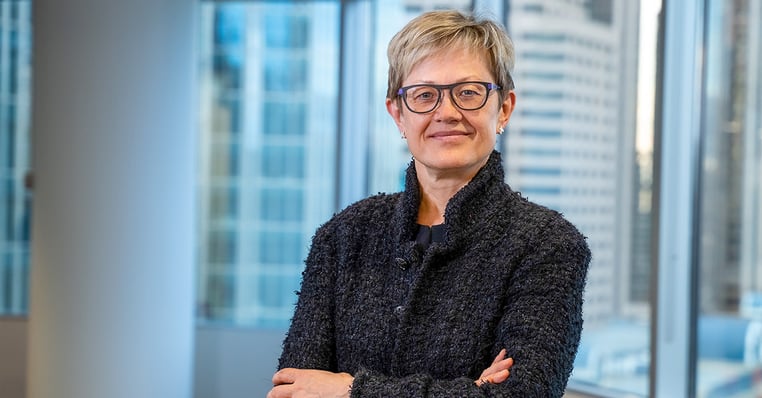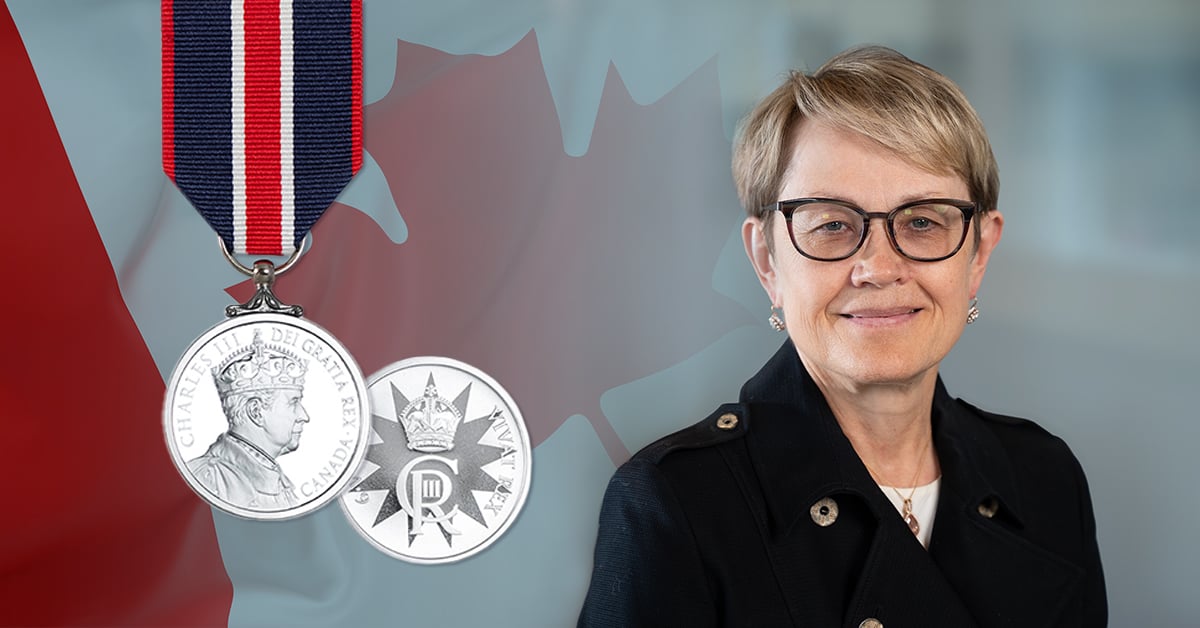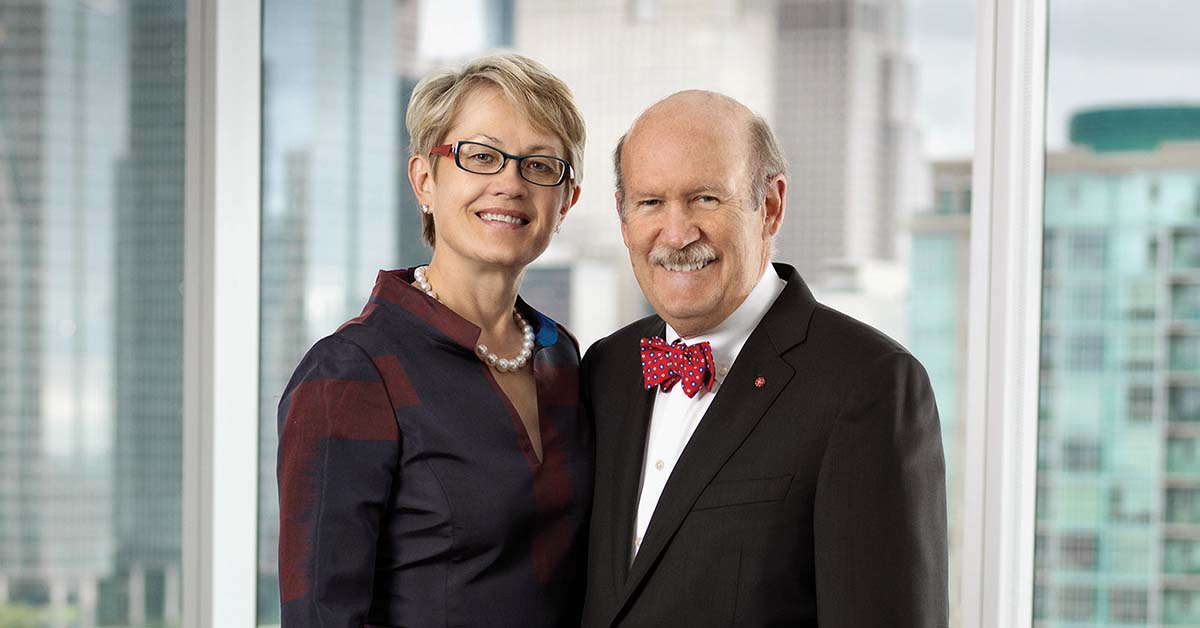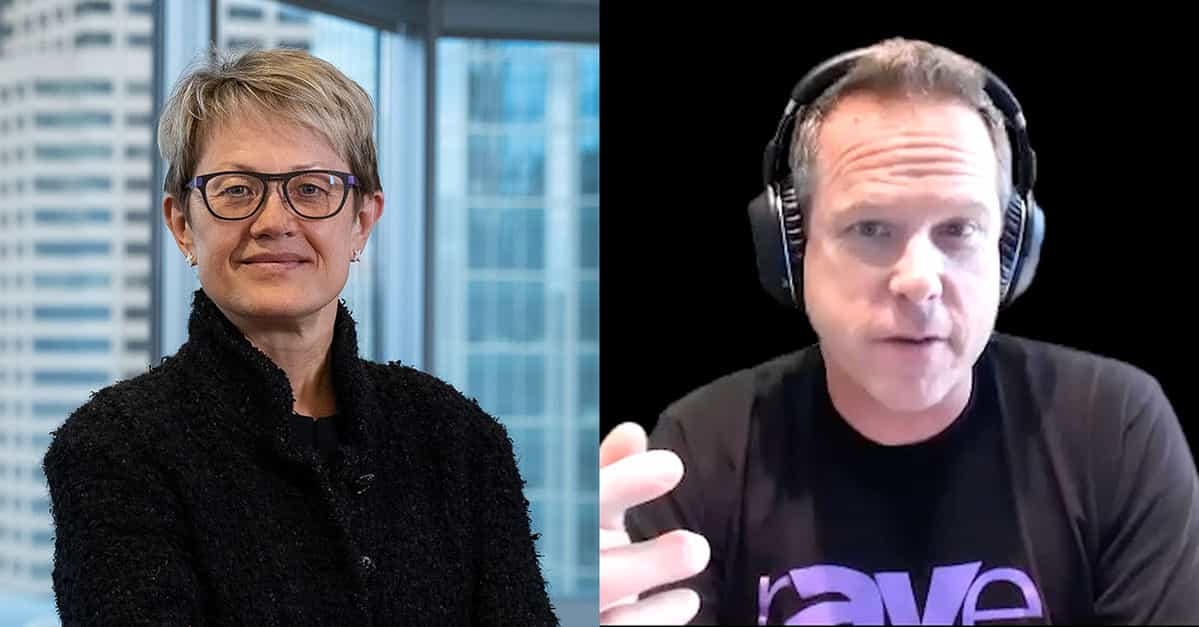Podcast: Leading by Example with Nancy Knowlton

Posted by Nureva on Mar 20, 2024 6:00:00 AM
Ever since her days as a child with a notebook full of business ideas, and long before co-founding SMART Technologies and Nureva, our CEO Nancy Knowlton has been a leader. In this episode of the Joe Momoh Presents podcast, she dives deep into what it means to be an entrepreneur, including lessons learned on the basketball court, how she and Dave Martin navigate work-life balance and the opportunities of AI.
Time stamps
02:45 — Origins of an entrepreneur
04:32 — Lessons learned on the basketball court
09:41 — Nancy’s superpower
10:52 — Opportunities of AI
15:07 — Calgary’s new tech landscape
16:33 — How repetition builds success
18:20 — Being lucky versus being good
21:31 — Working alongside David Martin
26:36 — The meaning of leadership
Podcast transcription
Joe Momoh: I’m really excited to have my next guest on the podcast. She’s the president and CEO at Nureva Inc. Welcome to the podcast, Nancy Knowlton.
Nancy Knowlton: Thank you for having me.
Joe: Absolutely, the pleasure is all mine. Let’s just jump right into it. How about you let the listeners know who you are and what you do.
Nancy: Well, as you said earlier, I’m Nancy Knowlton, and I am the CEO at Nureva. This is my second technology company. I would say that probably most people would actually know me from the time that my husband and I spent at SMART Technologies, about 25 years there growing that from the corner of our condo into a world leading company. And SMART is still doing great things in the realm of education.
Today, at Nureva, we have invented a whole new way of audio conferencing, something that we hope gets rid of some of the thorny, pesky problems that make people so aggravated when they’re on an audio conferencing call.
Origins of an entrepreneur
Joe: I love that. I read that you guys are raising the bar on audio conferencing. So that is quite awesome. I’d like to rewind a little bit. I’d love to know how you got to be such a serial entrepreneur. Like you said, you started SMART. Now you’re onto your next company, and I’m sure you’ll have another one after that. But how did you become such a serial entrepreneur? Walk us through that journey.
Nancy: It’s a funny thing. I started thinking about business when I was a little kid. It’s probably a stretch, but I’m going to say it anyway — I was financially pretty much independent of my parents by the time I was 12 years old. I bought pretty much everything for myself. Of course, I got the normal presents and things like that, but I was always doing something to earn a little bit of money.
I used to carry around a little book — it was really quite tiny, maybe 2 inches by 4 inches. In there I would write little ideas about things that I could do, and I would play with those ideas, try those ideas out. It wasn’t really starting a business, but I was thinking about business.
And then I did go to business school and got an undergraduate honors business degree and then an MBA. And then I also became a chartered accountant. Through that whole time, really my objective was to have a business, and all of that education was in preparation for being an entrepreneur.
Lessons learned on the basketball court
Joe: Now, I know that you’re quite the basketball player. I’m not sure if you still play anymore. But would you say your athletic background and that competitive spirit in sport has helped you become such a successful businessperson?
Nancy: You know, the fundamental factor in sports is actually time on task, and that means practice and more practice. That was just drilled into me from a very young age. I know a lot of people used to say to me, “Oh, you’re so good at this.” Yeah, but where were you on a Friday night or a Saturday night when I was in the gym doing all of the different things that nobody else was doing because they were at the pub having a good time? It really ingrained the need for sustained practice and hard work.
Joe: Absolutely. It’s just taking those free throws in the gym after hours. That’s the metaphor I use in life — are you shooting in the gym while everybody else is partying? So, you started SMART in 1987, I believe. And I’m sure you’ve gained so many golden nuggets of wisdom along your entrepreneurial journey. What would you say is one thing you wish you would have known when you first began your career?
Nancy: If I had known that everything was just going to work out, because we kept showing up, we kept doing the right things, I actually would have worried less. I spent an awful lot of sleepless nights, getting somewhere in the range of four or five hours of sleep, worrying over things needlessly. If I instead had spent the time sleeping and rejuvenating, I think I would have been a whole lot better off.
Joe: In terms of challenge and building that resilience, like you’re saying, sometimes sleepless nights, sometimes stress of vendor issues and whatnot — how do you build resilience in times of challenge? How do you get through those tough, tough nights or tough days?
Nancy: I think you want to reflect on what your problems and issues really are and see yourself making daily progress against what you think the solutions are.
I think about things in two different ways. I try to focus most of what I do every single day on today. What can I do today that’s going to improve where we’re going? Where we’re headed. And then what can I do for tomorrow? I like to do about 20% of things for tomorrow — setting things up, thinking about the future. Because if you just stay right on top of your day-to-day problems and that’s all you do, you really lose sight of how you’re going to build your way beyond your problems. That’s worked well for me.
Joe: So, it sounds like having some amount of energy put towards the future to prioritize actions to help you in the future. And then also kind of conquering the day as you go through your day.
Nancy: You bet. You do some things for the future. And pretty soon the future is today. And you’ve already accomplished a bunch of things that are already set up, so today becomes less difficult.
Joe: We were talking earlier, before the interview (you’re in California right now, not in the wintery, snowy Calgary), but to you personally, professionally, what does success look like for you?
Nancy: It’s having an impact — on people, on customers. It’s growing a good business. It’s seeing people develop.
And I’ll say this — and I know people are going to say, “Oh, come on,” but it really is true — it’s finding happiness. Happiness also comes from struggles, so it’s not just from having success, but it’s feeling that you’re making daily progress.
So, success isn’t a destination so much as it is for me the journey. Am I happy every day? Do I enjoy the interactions? Even if I’m arguing — and I will say sometimes I actually enjoy it when I lose because I can recognize that somebody else has got a superior idea or their way is just nuanced and a little bit better than mine.
Success is a number of things. It’s not a dollar number. It’s not a sales level. But it’s just the small accomplishments.
Nancy’s superpower
Joe: Absolutely. I always say success is in the journey and enjoying the journey rather than the destination. Going back to sport, it’s putting in those hours and enjoying the time at the free throw line and the gym shooting by yourself — all the sweat, blood and tears. You said as you go through your journey it’s all well worth it once you get to where you want to go, what your goal is. That really resonates and it’s something I always preach with my team as well. In terms of skills though, what would you say is Nancy’s superpower? What’s made you become so successful? I know you already talked about persistence and practice. But what would you say if you could whittle it down to one thing? What would you say is your superpower?
Nancy: Learning — learning every single day, not going passively through things. What did I learn? Where did I fail? How can I do that better? What did I do well and what did our team do well? How did we fail? How did we succeed? So it’s definitely learning.
Opportunities of AI
Joe: What’s something you’d say you’ve learned recently that’s really got your attention or got you curious?
Nancy: I feel like I’m a rank beginner in this whole area of artificial intelligence. Last week in particular this was a topic with our executive team. We want to wrap our arms around it and make sure that we understand not just the risks, but see where the opportunities are. As soon as you think you know something about AI, be prepared to be astonished by what else is going to come.
I think we’re really at the start of a very incredible opportunity. I’ve heard some people talk about it as really the next wave of, let’s call it, industry or industrialization. It’s the machines that are going to be helping us with algorithms that people haven’t even thought through yet. That really has my curiosity piqued. I’d love to write a book using ChatGPT. It’s just the beginning of a new learning journey.
Joe: Absolutely. I like to joke that ChatGPT is always a tab in my browser as I work. AI has definitely caught my interest and [is] definitely something I’ve been using quite frequently these days. When it comes to building a team, though, I’m curious, from your perspective, building a high-performing team, what sort of qualities do you look for or value most in employees?
Nancy: The two things that have served well as the core of people’s personalities and characters has to be trust and integrity. Actually, let me change trust to respect. It’s respect and integrity. Because if somebody has integrity, you inherently trust them. You just know where they’re coming from. And when people have respect, that respect goes through all of their interactions — not just with their coworkers, with their managers, but with customers, suppliers, with everyone. You never have to worry about who they are and what they’ll do because their work is coming from a good place.
Joe: Sounds like trust and integrity are key pieces in the puzzle of building a team. I think those are so important, especially when dealing with other team members or customers or vendors. Just having that integrity and trust is something … I mean in marketing you call it know, like and trust. You have to have that trust. What’s one common myth about the work that you do that you wish would be debunked?
Nancy: That it was quick and easy. I can remember interviewing people, and I would say to them, “Why is it that you would like to join SMART Technologies?” And they’d say, “Well, I’d like to get in on the ground floor.” Oh, no, honey. You’re not on the ground floor. It was 12 years in and people were looking at the company thinking they were getting in very early stage.
I will tell you it is much harder to grow a company from zero to say $2 million of revenue than it is from $5 to $50 million because you’ve got a little bit of traction, you know a little bit about what works and what doesn’t work. You can amplify the positives and get rid of the negatives. But it’s never quite as quick or easy as you might imagine.
Calgary’s new tech landscape
Joe: Yeah, what’s that saying — you work 10 or 15 years to become an overnight success. It’s never quick and easy. There’s always bumps along the way. Going back to enjoying the journey — if you really love the journey and the struggle and hustle, you can get through it with that resilience. So, we talked about the future a little bit, with AI. But I’m curious, from your journey, how has Calgary changed from when you first started to today?
Nancy: Today is incredible in Calgary. The number of phenomenal companies in Calgary just shows the incredible transformation in the whole tech sector in Calgary. It’s vibrant. There are so many people with excellent ideas that they’re bringing not just to Calgary or Canadian markets, but world markets as well. And that is the big difference. Back in the day when SMART was being born and growing up, there were some technology companies, but not a lot. Now it just feels wonderful to have some fellow travelers on the same journey.
How repetition builds success
Joe: Yeah, absolutely. The tech ecosystem here and business ecosystem here in Calgary has grown so much. That leads me to my next question. If you’re somebody looking to start on that entrepreneurial journey today, and you had mentioned there’s so many different businesses now in the marketplace, how do you differentiate your own brand or business in that competitive environment?
Nancy: I think you just have to be consistent in telling your story. A number of years ago we had the pleasure of working with an executive out of New York. And if we spent a couple of hours with him, he would have told us the same thing three, four, five different times. He would say, “Well, tell them what you’re going to tell them. Tell them. Tell them what you told them.”
I think that gets to marketing, right? Consistency in your message. Hey, we’re all about innovation and doing something different. We’re courageous. We want to step out into a little bit of the unknown. We’re not afraid to take big risks — and they’re calculated. But you want to be telling that same story over and over again because that’s how your brand gets known. You want to have your staff talking positively about the kind of energizing work that they’re doing and customer successes. It’s just repetition.
Joe: Seems like a common theme in this interview — repetition and consistency usually builds success.
Nancy: I think so.
Being lucky versus being good
Joe: That’s awesome. What’s one question that you never get asked that you wish you would be asked?
Nancy: I hope you laugh at this because, as I was thinking about this ahead of time, there’s one thing that I think people are just so very respectful that they never ask. And that question is: Were you good, or were you lucky?
And I have to say that I think I, and we, were good and are good. But sometimes luck and your timing and opportunity, that’s what really gives you an incredible boost. And I will tell you one small story that my husband and I often reflect on for SMART Technologies.
Tony Blair, when he was the prime minister of the UK, he said to his education minister, I want to be known as the education prime minister. Go and find some tools and some things that could transform UK classrooms so that people will see a pivotal point. And they’ll say, “Ah, education has changed.”
And his minister of education happened to see one of our SMART Boards in a classroom. And then he heard about it from another couple of advisors. And out of that, he and some of his aides crafted a plan that was presented to the prime minister that ultimately was funded, that saw thousands and thousands of UK classrooms transformed with interactive whiteboards and specifically SMART Boards. I want to say that we had about a 70% market share.
And like all good politicians, when something starts to work well, you want to shine the light on yourself. So, the UK started inviting in so many education ministries from around the world, and they started seeing interactive whiteboards in UK classrooms, and there were speakers expounding on the benefits. That whole movement got a life of its own.
And so yes, we were there. We lit the flame and got the fire started. But other people really fanned the flames for us. And I have to chalk that up to a good amount of luck and good timing.
Working alongside David Martin
Joe: It’s interesting. I’ve always heard that with consistency and working hard you almost manifest your own luck and luck kind of finds you. And that’s really fascinating that luck played a little bit in your journey. I’m sure it’s played a lot in other entrepreneurs’ journeys as well. Would you say you leaned on any resources along the way, like mentors or any other aides on your journey?
Nancy: It’s a funny thing to say because I don’t think a lot of people have the same experience or the same opportunity. I was very fortunate to start SMART and again Nureva with my husband. And we’ve had each other, complete trust, complete respect and really a common shared mindset around the journey that we are on. And that has sustained us a lot.
And beyond that we’ve been so fortunate to work with a number of very good people. Just coming back to your comment earlier about teams and sports, we always had a team where not everyone would have made an All-Star team but, working together, we were so much more than just the sum of us as individual people. I can tell you the energy that gets generated from that type of collegial and at times challenging, but always positive, work environment, that is incredibly sustaining.
Joe: You said you work with your husband and co-founded SMART together. How do you have a work-life balance when you’re working with family or, for anybody listening, with friends or family in general? How do you balance work at the dinner table? Or do you disconnect and talk about other things? How do you integrate that into your life?
Nancy: You might find it very hard to believe, but we do not often talk about business outside of the office. That is just something that has naturally occurred.
There were so many stresses in the early days. We were insolvent for four years — fortunately, the bank didn’t put us into bankruptcy — but there were so many hardships, so many difficulties. We needed an actual hard break. So, when we left the office, we stopped talking about work. We may have thought about it. But we didn’t speak to each other. We just needed that break. And that pretty much continues to today.
It’s a little more rigorously considered today though. You can appreciate that as a husband-and-wife team, there could be some concerns from other executives that decisions are being made at home where they’re not included. We’ve been pretty careful to not exclude the rest of the executive team as we think about things. So, I wouldn’t show up on a Monday with a new decision or new direction. That just does not happen.
Joe: Absolutely. You’re saying it’s all about the team, and having your team work together and collaborate is key to a big piece of success in my opinion as well.
Nancy: That’s right.
Joe: What would you say is something you’re proud of that we haven’t touched on in the interview so far?
Nancy: There is one item that I’m reminded of really quite frequently, and it’s the people that we have met along the way. Maybe people who joined us at SMART as their first job, and now we find them in executive roles in a good number of organizations around the city, whether it’s as a CEO or as a vice president. They’re being recognized and rewarded for their skill and ability, and we do take a level of pride that they had their first or an early work experience with us.
The meaning of leadership
Joe: It’s always awesome to see growth in the people you work with. That’s really awesome. I really appreciate you being on the podcast. It’s been a pleasure speaking with you, Nancy. I’m sure listeners have gained lots of insight into your journey and leadership in general. I usually like to end the podcast with one last question. And my last question to you, Nancy, is what does being a leader or leadership mean to you?
Nancy: When I originally started with the idea of having my own business, I had this concept that wouldn’t it be great because I could tell everybody what to do and I would always get my own way. And what I have learned about being a leader and leadership more generally is that it’s actually the opposite of that. It is what can I do to help? What is it that I singularly within the organization can do to assist somebody else to take away a roadblock, to provide clarity, to encourage them, to thank them. It has totally flipped from sort of dictating to being a servant leader. And, actually, that is a much more gratifying and less exhausting experience than being in charge and telling people.
Posted by
Nureva
March 20, 2024

















